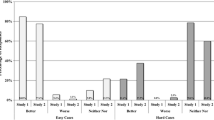Abstract
Two competing accounts of value incomparability have been put forward in the recent literature. According to the standard account, developed most famously by Joseph Raz, ‘incomparability’ means determinate failure of the three classic value relations (better than, worse than, and equally good): two value-bearers are incomparable with respect to a value V if and only if (i) it is false that x is better than y with respect to V, (ii) it is false that x is worse than y with respect to V and (iii) it is false that x and y are equally good with respect to V. Most philosophers have followed Raz in adopting this account of incomparability. Recently, however, John Broome has advocated an alternative view, on which value incomparability is explained in terms of vagueness or indeterminacy. In this paper I aim to further Broome’s view in two ways. Firstly, I want to supply independent reasons for thinking that the phenomenon of value incomparability is indeed a matter of the indeterminacy inherent in our comparative predicates. Secondly, I attempt to defend Broome’s account by warding off several objections that worry him, due mainly to Erik Carlson and Ruth Chang.
Similar content being viewed by others
Notes
The term ‘trichotomy’ is used by analogy with the mathematical law of trichotomy, which states that for any real numbers x and y, exactly one of the following relations holds: x < y, x = y, x > y. Of course, like the numerical relations, the three value relations can be reduced to just one (e.g. better than), and the other two relations defined in terms of it (a is worse than b iff b is better than a; a and b are equally good iff it is not the case that a is better than b and it is not the case that b is better than a).
A slightly ad hominem remark might be in order here, to the effect that, if Chang’s considerations were correct, they would seem to work not only against the claim that it is indeterminate whether a is better than b, but also against the claims that a and b are equal, roughly equal, or ‘on a par’, since all of these claims seem to entail that the choice between such items is, in an important sense, indifferent and therefore that Jack and Jill could flip a coin in order to settle their disagreement.
I say ‘in a sense’ because even in a situation like this, the answer to the question of whether Herbert is bald remains indeterminate, which means that their disagreement is in an important respect a mere clash of arbitrary stipulations. My point is only meant to show that the argument from feelings of non-arbitrariness is too weak, as these feelings can be explained by appeal to other considerations, like practical significance.
I owe this example to Tim Crane. See his website for a nice discussion of this and a few related examples (http://web.mac.com/cranetim/Tims_website/Jaffa_cakes.html).
To make room for the tolerance of the comparative ‘Fer than’, this should be qualified to read: ‘It takes only the slightest discernible asymmetry …’. The point does not affect the argument negatively, however, since the asymmetry between x and y to which Broome draws our attention is certainly discernible in this sense.
It might very well be, given what she says a couple of pages later: ‘…strictly speaking, Broome does not need the collapsing principle to collapse to the truth of x’s being Fer than y; he could just as well say that the collapse is to the falsity of x’s being Fer than y’ (Chang 2002a: 167).
References
Broome J (1997) Is incommensurability vagueness? In: Chang R (ed) Incommensurability, incomparability, and practical reasoning. Harvard University Press, Cambridge, pp 67–89
Broome J (2001) Greedy neutrality of value. In: Rabinowicz W (ed) Value and Choice, vol 2. University of Lund, pp 7–16
Broome J (2004) Weighing lives. Oxford University Press, Oxford
Carlson E (2004) Broome’s argument against value incomparability. Utilitas 16:92–98
Chang R (2002a) Making comparisons count. Routledge, London
Chang R (2002b) The possibility of parity. Ethics 112:659–688
Griffin J (1986) Well-being: its meaning, measurement, and moral importance. Oxford University Press, Oxford
Parfit D (1984) Reasons and persons. Oxford University Press, Oxford
Raz J (1985–86) Value incommensurability: some preliminaries. Proc. of the Aristot. Soc. 86: 117–134
Raz J (1986) The morality of freedom. Clarendon, Oxford
Wright C (1976) Language mastery and the sorites paradox. In: Evans G, McDowell J (eds) Truth and meaning: essays in semantics. Oxford University Press, Oxford, pp 223–247
Acknowledgements
I would like to thank Simon Blackburn and Hallvard Lillehammer for valuable suggestions and comments on earlier drafts of this paper. Versions of the paper have been presented at a Philosophy Colloquium in St. John’s College, Cambridge in November 2007, at the 11th Annual Oxford Philosophy Graduate Conference, as well as at the 2010 Conference of the British Society for Ethical Theory. I thank the audiences at these conferences, and in particular Arif Ahmed, Krister Bykvist, James Dreier, Jane Heal, Antti Kauppinen, Karen Nielsen, and Pekka Väyrynen for their helpful feedback. I am also grateful to Miha Constantinescu, Laura Vasile, and George Turturea for numerous conversations on the matters discussed here. Research for this paper was funded by the Cambridge Overseas Trust and by Trinity College, Cambridge.
Author information
Authors and Affiliations
Corresponding author
Rights and permissions
About this article
Cite this article
Constantinescu, C. Value Incomparability and Indeterminacy. Ethic Theory Moral Prac 15, 57–70 (2012). https://doi.org/10.1007/s10677-011-9269-8
Published:
Issue Date:
DOI: https://doi.org/10.1007/s10677-011-9269-8



